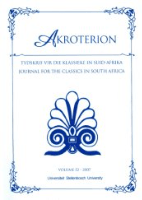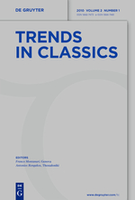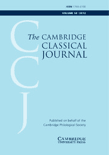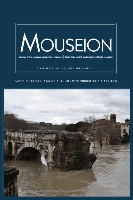
Minerva-Revista de Filologia Clasica
Scope & Guideline
Fostering dialogue in Classics and Linguistics.
Introduction
Aims and Scopes
- Classical Literature and Textual Analysis:
The journal emphasizes the critical examination of classical literary works, including poetry, drama, and prose, analyzing their themes, structures, and historical contexts. - Linguistic Studies and Philology:
A significant focus is placed on the study of ancient languages, grammar, and syntax, particularly Latin and Greek, as well as their evolution and impact on modern languages. - Cultural and Historical Contexts:
Research often explores the cultural, social, and political influences of classical texts, investigating their roles in shaping historical narratives and ideologies. - Interdisciplinary Approaches:
Minerva encourages interdisciplinary scholarship, integrating perspectives from history, philosophy, and the arts to enrich the understanding of classical texts and their relevance. - Reception Studies:
The journal looks at how classical works have been received and interpreted across different historical periods, including their adaptations in literature and art.
Trending and Emerging
- Intersections of Classical and Modern Literature:
There is a notable increase in studies that examine the influence of classical texts on contemporary literature and media, reflecting a growing interest in the relevance of classical themes in modern contexts. - Gender and Violence in Classical Narratives:
Research addressing themes of gender, particularly the portrayal of women and violence in ancient texts, has gained prominence, highlighting the journal's commitment to exploring social issues through classical literature. - Philosophical Reflections on Classical Texts:
Emerging themes in philosophical interpretations of classical works suggest a trend towards exploring the ethical and metaphysical implications of ancient texts, indicating a revival of interest in philosophical discourse. - Material Culture and Ancient Practices:
An increasing number of studies focus on the material aspects of ancient societies, such as rituals, magic, and everyday life, showcasing a trend towards understanding the lived experiences of historical populations.
Declining or Waning
- Traditional Historical Narratives:
There seems to be a decreasing focus on conventional historical accounts of classical figures and events, as contemporary scholarship increasingly favors thematic and interdisciplinary analyses. - Narrowly Defined Literary Genres:
Research centered on specific literary genres, such as epic poetry or tragedy, has become less frequent, suggesting a move towards more expansive and integrative approaches to classical literature. - Localized Studies:
Studies concentrating solely on regional or localized classical themes are waning, possibly due to a growing emphasis on global perspectives and interconnectedness in classical studies.
Similar Journals

Akroterion-Journal for the Classics in South Africa
Bridging Past and Present: The Classics in a Modern ContextAkroterion: Journal for the Classics in South Africa is a premier open-access journal dedicated to advancing the study of classical antiquity within the context of South Africa and beyond. Founded in 1990 and published by SUNJOURNALS, this journal serves as a vital platform for the dissemination of scholarly articles, reviews, and critical perspectives that delve into the rich tapestry of classical literature, history, and culture. Based in Stellenbosch, South Africa, it provides international accessibility for researchers and scholars alike, enhancing the global discourse on classical studies. Despite its classification in the Q4 quartile of Classics and the 17th percentile of Scopus rankings, Akroterion remains committed to fostering innovative research and nurturing emerging voices in the field. By offering an open-access model, it ensures that valuable academic contributions reach a wider audience, empowering enthusiasts and professionals to explore the timeless relevance of classical studies today.

Eikasmos-Quaderni Bolognesi di Filologia Classica
Connecting Ancient Wisdom with Modern InquiryEikasmos-Quaderni Bolognesi di Filologia Classica is a distinguished journal that focuses on the fields of Classics, Linguistics, and Language, published by PATRON EDITORE S R L in Italy. With its ISSN 1121-8819, the journal has been a vital platform for the dissemination of scholarly work from 2011 until 2021, contributing significantly to the dialogue within these disciplines. Although recognized in the lower quartiles (Q4) of various categories within Scopus, including Classics and Linguistics, and having ranked in the 37th and 19th percentiles respectively, Eikasmos stands as an invaluable resource for researchers, academics, and students committed to exploring classical philology and its interconnections with modern linguistic studies. The absence of an open access model underscores the importance of institutional support in accessing this scholarly work, which continues to enrich the academic landscape of classical studies.

Trends in Classics
Elevating classical discourse for a modern audience.Trends in Classics is a distinguished academic journal published by WALTER DE GRUYTER GMBH, dedicated to advancing the field of Classics through critical scholarship and innovative research. With an ISSN of 1866-7473 and an E-ISSN of 1866-7481, this journal offers a platform for scholars from around the globe to share insights on classical literature, history, and archaeology. Indexed in Scopus and awarded a respectable Q4 classification in Classics, it ranks 48th out of 170 in the Arts and Humanities category, placing it in the top 72nd percentile—an indicator of its growing influence and contribution to the field. Operating from Germany, specifically from Genthin Strasse 13, D-10785 Berlin, the journal spans converged years from 2009 to 2024, fostering ongoing dialogues and developments within classical studies. Although it does not currently offer open access, its commitment to scholarly excellence makes it a vital resource for researchers, professionals, and students alike, who seek to deepen their understanding of ancient cultures and their lasting impacts on contemporary society.

Cambridge Classical Journal
Advancing the Legacy of Classical ScholarshipThe Cambridge Classical Journal, published by Cambridge University Press, is a prestigious academic journal that has been a cornerstone of classical scholarship since its inception in 1884. With a focus on advancing knowledge in the fields of Classics, Linguistics, and Literature and Literary Theory, the journal operates with an annual publication cycle, showcasing cutting-edge research that contributes significantly to these disciplines. With a commendable impact factor and ranking in the top quartile (Q1) for Classics and Q2 for Literature and Literary Theory as of 2023, it remains an essential resource for scholars, students, and professionals alike. The journal's commitment to excellence is evident in its rigorous peer-review process and its role in fostering scholarly dialogue on classical texts and their linguistic and cultural implications. While the Cambridge Classical Journal is not an open-access publication, it is invaluable for anyone seeking to deepen their understanding of the classical world and its enduring influence on contemporary thought.

Antichthon
Advancing Scholarship in Classical StudiesAntichthon, published by Cambridge University Press, stands as a vital platform within the field of Classics. Established in 1986, the journal has evolved to encompass scholarly contributions that explore various dimensions of classical studies, including literature, history, and cultural studies. With its rich publication history extending from 2011 to 2023, Antichthon boasts a commendable Q2 ranking in the latest 2023 Category Quartiles for Classics, reflecting its significant impact in the academic community. Although the journal does not offer an Open Access option, it continues to engage researchers and academics with its curated selection of articles, reviews, and critical insights. Located at the Edinburgh Building, Shaftesbury Rd, Cambridge, England, this journal remains an essential resource for both established scholars and students aiming to deepen their understanding of classical antiquity and its enduring relevance.

QUADERNI URBINATI DI CULTURA CLASSICA
Fostering Interdisciplinary Connections in the HumanitiesQUADERNI URBINATI DI CULTURA CLASSICA is a distinguished academic journal dedicated to the interdisciplinary exploration of Classics, Linguistics, and Literary Theory. Published by ACCADEMIA EDITORIALE PISA-ROMA, this journal serves as a vital scholarly platform for researchers and professionals alike, facilitating in-depth discussions and analyses that contribute to these evolving fields. With an ISSN of 0033-4987 and an E-ISSN of 1724-1901, it boasts a robust Scopus ranking, placing it within the second quartile in Classics and the third quartile in related disciplines as of 2023. Although it is not an open-access journal, QUADERNI URBINATI DI CULTURA CLASSICA remains essential for those engaged in the study of language, literature, and classical cultures, encouraging scholarly exchange and innovation from its base in Rome, Italy. Researchers and students will find valuable insights and methodologies within its pages, making it a key resource for fostering academic growth and understanding.

Exemplaria Classica
Exploring the Depths of Classical LiteratureExemplaria Classica, published by Universidad de Huelva's Servicio de Publicaciones, is a prominent academic journal dedicated to the fields of Classics and Literature and Literary Theory. Established in 2011, this journal serves as a vital resource for scholars, educators, and students interested in the rich tapestry of classical literature and its enduring influence on contemporary thought. With an ISSN of 1699-3225 and an E-ISSN of 2173-6839, it has firmly established itself in the academic community, although it currently holds a Q4 ranking in both its categories. The journal is ranked #712 out of 1106 in Literature and Literary Theory and #129 out of 170 in Classics as per Scopus rankings, reflecting its emerging status in these fields. Despite its open access designation being currently unclear, Exemplaria Classica is essential for advancing discussions and research in classical studies and has covered a diverse range of topics over its publishing years, making it an important addition to any academic library.

Rivista di Filologia e di Istruzione Classica
Illuminating the Intersection of Literature and EducationRivista di Filologia e di Istruzione Classica is a distinguished academic journal published by LOESCHER EDITORE, dedicated to advancing the fields of Classics and Linguistics. Based in Italy, this journal serves as a vital platform for original research, critical analysis, and scholarly discussions that enrich our understanding of classical texts and educational methodologies in the humanities. With its unique focus on the intricate relationship between classical literature and language, the journal aims to facilitate discourse among researchers, educators, and students alike. Although categorized in the fourth quartile in both Classics and Linguistics, it provides an essential venue for scholars seeking to disseminate their findings and engage with contemporary academic debates. The journal is indexed in various databases, though recent coverage in Scopus has been discontinued. Researchers interested in exploring the complex layers of classical philology and instructional practices are encouraged to contribute to and engage with the innovative scholarship presented in this journal.

Mouseion-Journal of the Classical Association of Canada
Uncovering the past, enriching the present.Mouseion - Journal of the Classical Association of Canada, published by University of Toronto Press Inc, stands as a vital academic resource in the fields of Classics and Archaeology. With a focus on promoting scholarly discourse, this journal provides a platform for original research, critical reviews, and interdisciplinary studies that engage with ancient cultures and their legacies. Since its convergence in 2019, Mouseion has quickly established itself within the academic community, achieving a commendable Q1 ranking in Classics and Q2 in both Archaeology categories in 2023, showcasing its commitment to excellence. While not an open-access journal, it is positioned among the top 29% of classics journals, reflecting its impact and the quality of publications. Nestled within Canada, this journal addresses a global audience of researchers, professionals, and students dedicated to the exploration of the classical world, and it endeavors to contribute significantly to the scholarly understanding of cultural heritage.

Cuadernos de Filologia Clasica-Estudios Griegos e Indoeuropeos
Unveiling the Rich Tapestry of Ancient LanguagesCuadernos de Filologia Clasica-Estudios Griegos e Indoeuropeos, published by Universidad Complutense de Madrid, serves as a vital platform in the fields of Classics and Linguistics. With an ISSN of 1131-9070 and an E-ISSN of 1988-2637, this journal showcases rigorous academic research that spans both Greek studies and Indo-European linguistics. Recognized within the Q1 quartile in Classics and the Q2 quartile in Linguistics and Language, it highlights its standing among peers in these disciplines, particularly reflecting its commitment to advancing scholarly conversation. Though currently lacking in Open Access options, its emphasis on quality content ensures it maintains an intellectual influence, as evidenced by its ranking of #112 in Classics and efforts to engage researchers and students alike. The journal's coverage from 2011 to 2024 positions it as a rich historical resource, while its address in Madrid places it at the heart of European classical studies. By offering insights into the fundamental aspects of language, literature, and ancient cultures, Cuadernos de Filologia Clasica remains a critical resource for those seeking to deepen their understanding of the classical world and its enduring linguistic legacies.